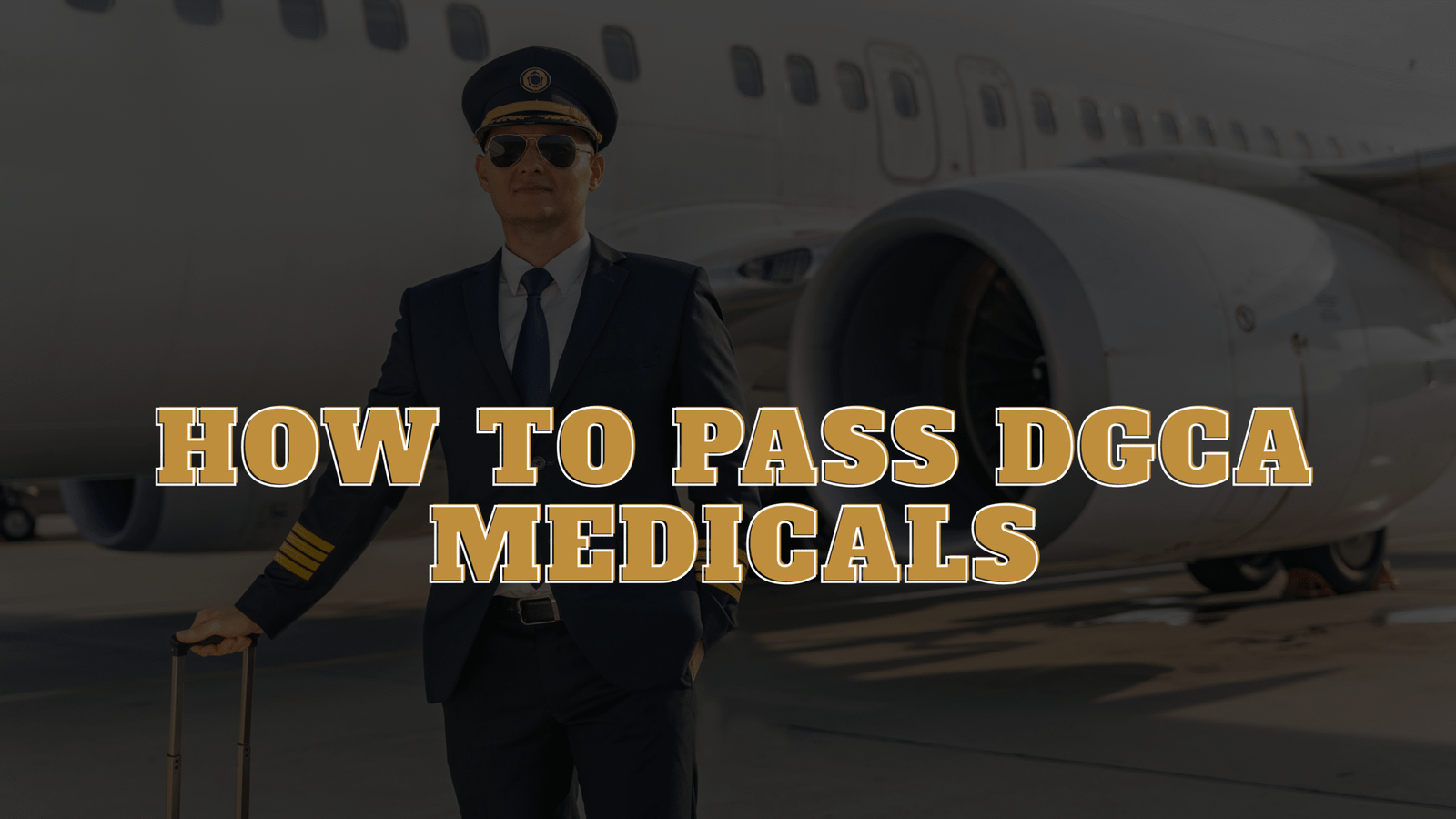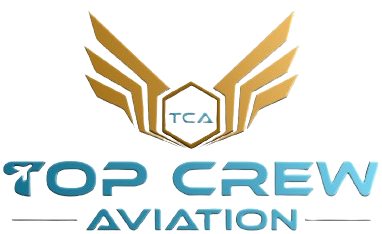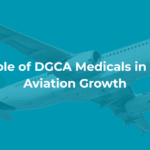
Becoming a pilot in India is an exciting and ambitious goal. But before you can set foot in the cockpit, there’s one importat hurdle you must clear — the DGCA medical examination. The Directorate General of Civil Aviation (DGCA) has strict health standards for pilots to ensure that those who fly are physically and mentally capable of handling the responsibilities of aviation.
This guide will take you through Class 1 and Class 2 DGCA medicals, explain the tests in detail, give you preparation strategies, and even list DGCA-approved doctors so you know exactly where to start.
What Are DGCA Medicals and Why Do They Matter
DGCA medicals are official health assessments designed to evaluate your fitness for flying. These are not just routine check-ups — they follow ICAO (International Civil Aviation Organization) standards, which means the same rules apply globally for airline pilots. The tests assess your eyesight, hearing, heart health, lung capacity, mental stability, and overall physical condition.
The main goal is to ensure safety in the skies. Aviation is a high-stress, high-responsibility profession, and even small health issues can cause serious risks during flight. For example, a sudden drop in blood pressure or a vision problem in mid-air can compromise not only your safety but also that of passengers and crew. Passing your medicals is, therefore, both a regulatory requirement and a personal safety assurance.
The Two Types of DGCA Medicals
In India, pilot medicals are divided into two categories — Class 2 and Class 1. Each has its own purpose, level of examination, and validity period.
Class 2 medicals are your starting point. If you’ve just finished your 10th or 12th standard and want to apply for a Student Pilot Licence (SPL), you must pass this first. It is conducted by DGCA-empanelled doctors across India, making it relatively easier to schedule. For those under 40 years old, this certificate is valid for two years.
Class 1 medicals are more advanced and are required before you apply for a Commercial Pilot Licence (CPL) or start airline training. These are conducted only at specific DGCA-approved centers, such as AFCME in Delhi or IAM in Bengaluru. For candidates under 40, Class 1 medicals are valid for one year, after which you’ll need to renew them regularly.
Step-by-Step Guide to Passing Class 2 Medicals
Your journey begins with Class 2 medicals. The first step is finding a DGCA-approved Class 2 medical examiner. The DGCA website has a complete, updated list, but you can also get recommendations from pilot training academies or current pilots. Choose a doctor in your city or nearby for convenience.
Once you’ve selected your examiner, contact their office to book an appointment. During your Class 2 examination, you’ll undergo tests such as:
- Vision assessment for near and distance clarity, as well as color blindness checks.
- Hearing test to ensure you can respond to cockpit communications.
- Blood and urine analysis to detect sugar levels, infections, or organ issues.
- ECG (Electrocardiogram) to monitor heart rhythm.
- Height, weight, and BMI checks.
If you meet all the required standards, the doctor will forward your results to DGCA. You will then be assigned a Medical File Number, which you must keep safe for your future Class 1 application.
Moving on to Class 1 Medicals
After passing Class 2, the next step is booking your Class 1 medical examination. Unlike Class 2, this process is centralized. You’ll need to log into the eGCA portal (https://egca.dgca.gov.in) and select the “Class 1 Medical Assessment” option. From there, you can choose your preferred center, though availability can sometimes require booking months in advance.
Class 1 medicals are far more comprehensive. In addition to the Class 2 checks, you’ll also undergo:
- Chest X-ray to detect lung and heart conditions.
- Lung function tests (Spirometry) to measure breathing capacity.
- Treadmill stress test (TMT) for advanced heart performance analysis.
- Specialist ENT examination for ear, nose, and throat health.
- Advanced ophthalmology checks, including retinal scans.
- Psychological evaluation, which may test reflexes, coordination, and decision-making speed.
If you pass, the DGCA will issue your Class 1 Medical Certificate via the eGCA system. This document is your green light to apply for a CPL or start airline training.
Medical Standards You Must Meet
DGCA sets precise fitness benchmarks for pilots. For example, your vision must be 6/6 in each eye, either naturally or with corrective lenses. Color vision must be clear enough to pass the Ishihara test. Hearing should be good enough to understand conversational voice from two meters away, and your BMI must fall between 18.5 and 29.9 in most cases.
Your heart rhythm, blood pressure, and lung function must also be within normal limits, and you should have no history of epilepsy, serious psychiatric disorders, or substance abuse. These standards may sound strict, but they are designed to ensure that you can operate an aircraft safely without health-related distractions.
Preparing for DGCA Medicals
Preparation is just as important as the tests themselves. Ideally, start a month in advance by adopting a healthy lifestyle — eat balanced meals, stay hydrated, and get regular exercise. Avoid processed foods, excessive sugar, and caffeine. Maintaining a healthy weight within the DGCA BMI range is importat.
A week before your test, focus on getting good sleep and avoiding alcohol or smoking, as these can affect blood pressure and heart results. On the day of the examination, eat a light breakfast, carry all required documents in a folder, and arrive early to avoid stress. Remember, anxiety itself can temporarily raise your blood pressure, so stay calm and composed.
Required Documents
When you go for your DGCA medicals, bring:
- Aadhaar card or passport (original and photocopy)
- 2–4 recent passport-size photographs
- Class 10 and 12 mark sheets for date of birth verification
- Medical history records, if any
- Your DGCA Medical File Number for Class 1 applications
- Appointment confirmation slip (especially for Class 1)
Having everything ready prevents unnecessary delays and ensures your application is processed smoothly.
Common Reasons for Disqualification
Not everyone passes on their first attempt. Some common disqualifiers include color blindness, hearing impairment beyond permissible limits, severe myopia, abnormal heart function, uncontrolled diabetes, and a history of seizures or psychiatric disorders.
It’s important to note that a “Temporary Unfit” status doesn’t mean the end of your pilot career. In many cases, once you address the issue — for example, controlling blood pressure or correcting vision — you can reapply and pass.
DGCA-Approved Class 2 Medical Examiners
Here’s a partial list of approved doctors (always check the official DGCA site for the latest updates):
| Delhi NCR | Dr. Sanjay Gulati | Sir Ganga Ram Hospital | Dr. S. K. Jain | Apollo Hospital |
| Mumbai | Dr. Gaurav Mehta | Fortis Hospital | Dr. Rajiv Bhatia | Lilavati Hospital |
| Bengaluru | Dr. Ramesh Babu | Manipal Hospital | Dr. Vinod Kumar | Columbia Asia Hospital |
| Kolkata | Dr. Abhijit Das | AMRI Hospital | Dr. Sunil Chakraborty | Apollo Gleneagles |
| Chennai | Dr. Ashok Kumar | Apollo Hospital, Greams Road | Dr. Suresh Kumar | Fortis Malar Hospital |
Class 1 Medical Centers in India
Class 1 medicals are conducted only at:
- Air Force Central Medical Establishment (AFCME) – New Delhi
- Institute of Aerospace Medicine (IAM) – Bengaluru
- Medical Examination Centre (MEC) – Mumbai
- Command Hospital – Kolkata
These centers follow strict procedures and have longer waiting lists, so early booking is advised.
Cost and Processing Time
The cost varies depending on the center and additional tests, but on average, Class 2 medicals cost ₹3,000–₹6,000, while Class 1 medicals range from ₹6,000–₹10,000. Processing times are typically two to four weeks for Class 2 results and about two to three weeks for Class 1 certificates.
Final Thoughts
Passing DGCA Class 1 and Class 2 medicals is a necessary step toward becoming a professional pilot. The process might seem intimidating, but with the right preparation and understanding of what’s involved, you can clear it smoothly. Start with Class 2, maintain your health, keep documents organized, and approach each test with confidence.
Once you hold your Class 1 Medical Certificate, you’ll be one step closer to taking control of the cockpit and turning your aviation dreams into reality.
Expert Tips from Airline Pilots Who Cleared DGCA Medicals
While the official process is straightforward, pilots who have gone through it often have valuable insights that aren’t mentioned on the DGCA website. Here are some insider tips from commercial pilots who cleared their medicals successfully:
- Book Early, Especially for Class 1
DGCA Class 1 medical centers often have waiting periods of one to two months, especially during peak admission seasons for flight schools. Many pilots suggest booking your slot as soon as you get your Class 2 results to avoid delays in starting training.
- Don’t Hide Past Medical Issues
Some candidates worry that disclosing past surgeries, injuries, or health problems will automatically disqualify them. In reality, DGCA examiners appreciate honesty. If the condition has been treated and is stable, you can often still be declared “Fit.” Hiding medical history, however, can cause serious problems later if the issue reappears.
- Get a Pre-Medical Check-Up
Before attending your official DGCA medical, consider doing a general health check-up at a local hospital. This will allow you to spot potential red flags like high cholesterol, borderline blood pressure, or minor eye issues, giving you time to address them before the official test.
- Avoid Temporary Lifestyle Triggers
Some otherwise healthy candidates fail temporarily because of avoidable factors. Lack of sleep, dehydration, heavy alcohol use, or even excessive caffeine can cause abnormal blood pressure or heart readings. Pilots recommend avoiding these triggers at least one week before the test.
- Keep All Records for Renewals
Your medical journey doesn’t end after your first Class 1 certificate — it must be renewed annually (or every six months if over 40). Keeping a clean, organized file of all medical results and reports will make future renewals smoother.
- Build a Long-Term Healthy Lifestyle
Passing the medical once is not enough — you must maintain fitness throughout your career. Airline pilots often recommend regular cardio exercise, a balanced diet, mental health care, and routine health monitoring to avoid surprises during renewals.
- Your First Step Towards the Cockpit
The DGCA medical process can seem overwhelming at first, but it’s really about proving to yourself and to aviation authorities that you have the physical and mental capacity to fly safely. Think of it as your first flight test — one that takes place in a medical center instead of an aircraft.
By starting early, preparing thoroughly, and following the guidance of those who’ve been there before, you can clear Class 2 and Class 1 medicals confidently. Once you have that Class 1 certificate in your hands, you’re officially cleared for takeoff on your pilot training journey.
Frequently Asked Questions
No FAQs found.



